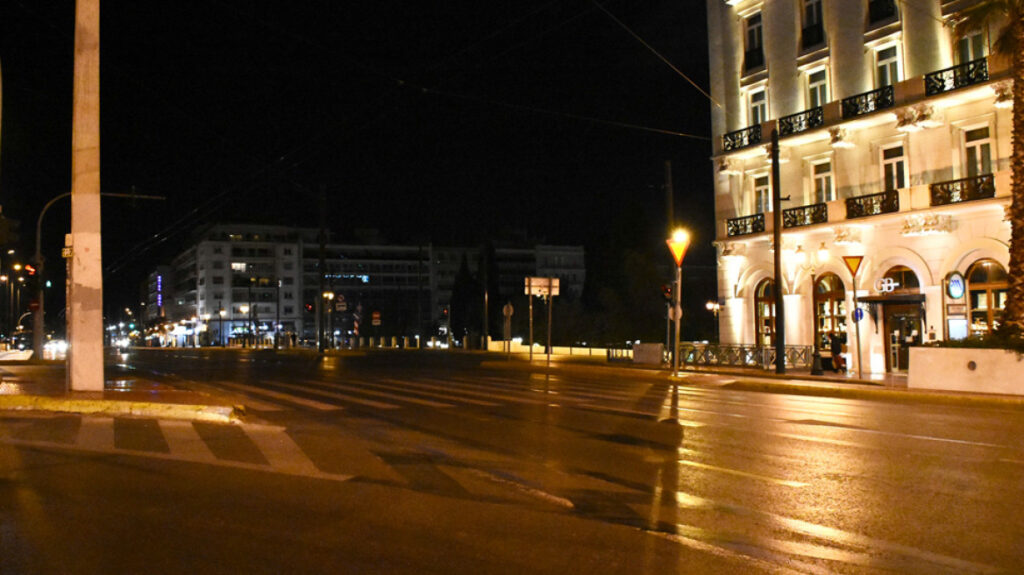
A ban on the movement of citizens throughout the country was announced today 22/03/2020 by the government with effect from tomorrow at 6 am until 6 am until 6 am.
The General Secretariat for Civil Protection published 18 useful questions - answers on the ban on the movement of citizens throughout the country, which are presented in detail below:
1. What does a ban on the movement of citizens mean and why is it being taken now as a measure?
The easy transmission and spread of the coronavirus poses a serious risk to the health of vulnerable and vulnerable groups of the population and a great pressure on the health system that is called upon to provide simultaneous hospitalization to a very large number of sick people. The situation faced by hospitals of other countries that did not take drastic measures in time speaks for itself. The curfew of citizens with explicit exceptions to strictly limited activities breaks the chain of dispersal and keeps us healthy in our homes to avoid the worst. Taking into account the experience of other countries, it is necessary to do so now.
2. Since when does the ban on the movement of citizens come into force?
From Monday 23/3/2020 at 6am with effect until April 6, 2020 at 6am.
3. Does it concern specific areas or the whole territory?
It concerns the entire Greek Territory without exception.
4. Are there any exceptions for citizens who have to apply it?
Yes, there are exceptions. The ban does not apply to those serving in the security forces and the armed forces, as well as medical and nursing staff and authorized personnel of the General Secretariat for Civil Protection for the fulfillment of their duties.
5. In which cases will citizens be allowed to move?
The movement of citizens will be allowed for the following restrictive reasons:
a) Commuting to and from work for working hours.
b) Going to a pharmacy or visiting the doctor, if this is recommended after relevant communication.
c) Going to an operational store for the supply of essential goods, where it is not possible to send them.
d) Going to the bank, to the extent that it is not possible to make an online transaction.
e) Movement to provide assistance to people in need.
f) Going to a ceremony (e.g. funeral, wedding, christening or similar ceremonies) under the conditions laid down by law.
g) Physical exercise outdoors or movement with a pet, individually or per two people, observing in the latter case the necessary distance of 1.5 meters.
h) One-time transfer to the place of permanent residence.
6. Who and how will check compliance with the above exceptions?
The Greek police are in charge of controlling the movement of citizens. In addition, the Municipal Police, the Port Authorities in their area of responsibility and the National Transparency Authority participate where necessary in the audit work. Citizens must carry with them their identity card or passport as well as a certificate of movement.
7. Will there be fines for those who do not comply?
Yes. For each infringement it detects, it will impose an administrative fine of one hundred and fifty (150) euros.
8. What is a movement certificate?
For the needs of limited travel, two types of documents are created. The first, the type A certificate, concerns the movements of employees, is completed once and is provided under the personal responsibility of the signatory by the employer or his legal representative in the case of a legal person or, in the case of a self-employed or self-employed person, by himself. It contains the name, place of residence and place of work of the employee, as well as the hours of his arrival and departure. The employee must carry it with him during his travels to and from work.
9. What do we do for the rest of the movements that are excluded?
For other cases (going to a supermarket, pharmacy, bank, etc.) and for each individual movement, citizens must fill in the type B certificate each time with the name, place of residence and place of destination of the citizen, as well as the specific reason for the movement.
10. Where do I find these certificates?
The certificates can be obtained as they are from the forma.gov.gr website and filled in by the citizen. You can download, complete, and bring with you one of the following forms, as appropriate.
- Employee Movement Certificate (PDF)
- Employee Movement Certificate (MS-Word)
- Certificate of Exceptional Movement of Citizens (PDF)
- Certificate of Exceptional Movement of Citizens (MS-word)
It is also possible to fill in a handwritten form in case it is not possible to access the website.
The handwritten certificate must have the following information:
- First Name/Last Name
- Home address
- Reason for movement falling under the above permitted categories and destination address
- Date, time, signature
11. Can I alternatively declare my movements in another way (eg mobile) so as not to fill in the certificates manually?
Yes, it is possible to send a free telecommunication message (sms) to the special number 13033 directly from the mobile phone of the person concerned every time the citizen leaves his home. In this message, the citizen should state his name, his home address and the reason that corresponds to leaving the house (cases b to h). The SMS must be of the format:
X blank name and home address
where X is the output ratio with the number 1, 2, 3, 4, 5, 6 corresponding to the following reasons:
- Go to a pharmacy or visit the doctor, if this is recommended after relevant communication.
- Going to an operating store for the supply of essential goods, where it is not possible to send them.
- Go to the bank, insofar as it is not possible to make an online transaction.
- Movement to help people in need.
- Going to a ceremony (e.g. funeral, wedding, christening or similar ceremonies) under the conditions laid down by law.
- Physical exercise outdoors or movement with a pet, individually or per two people, observing in the latter case the necessary distance of 1.5 meters.
You will receive in response:.
Move blank X empty name and home address
In case of a check, show the SMS along with your id card.
12. If my work is outside the city where I live?
In case it is absolutely necessary to move an employee away from headquarters, he/she must bring with him/her two certificates (Type A certificate and Type B certificate).
13. What if at the time of the entry into force of the travel restriction I am in another part of Greece than my place of permanent residence and I have to return? Will I be allowed?
Φυσικά, σε αυτή την περίπτωση θα χρειαστεί και μια Βεβαίωση Κατοικίας Ειδικής Χρήσης, που λαμβάνεται ατελώς από τον ιστότοπο: https://www.aade.gr/bebaiosi-katoikias-eidikis-hrisis, ή αντίγραφο της φορολογικής δήλωσης εισοδήματος Ε1.
14. Which public places am I not allowed to go to?
From Monday 23/3 they do not operate and the stay of citizens in playgrounds, outdoor sports areas, organized marinas, parks and groves is prohibited.
15. Does the curfew affect the operation of those businesses that have remained open until today by a relevant decision of the state (e.g. supermarkets, bakeries, pharmacies, gas stations, etc.)?
No. Businesses and public services that have remained open continue to operate normally, taking into account the instructions for the movement of workers to and from them.
16. Will public transport continue to operate during the curfew?
Public Transport operates at a limited frequency during the day, ensuring sufficient traffic especially during the hours of movement of employees. Private vehicles are used for all the reasons-exceptions provided above only with the driver and up to one passenger.
17. What do the new curfew restriction measures mean for the functioning of the state and businesses?
The state and the productive fabric are not paralyzed. They continue to operate with the necessary staff and based on the instructions given by the administrations of each institution, but under the strict framework of rules set by the new restrictions on our movement.
18. What about the curfew on special groups of the population, such as drug addicts, Roma and the homeless?
With the special care of the municipality concerned, the Roma populations of each area are informed by any appropriate means, so that they can remain throughout the period of the temporary restriction of movement within the camps. Homeless and drug addicted people are moved, under the care of the municipality, to appropriate municipal accommodation and are provided with all possible care, soup kitchens and care. The social services/structures of the municipalities ensure the home delivery of the daily meals to beneficiaries of organized soup kitchens and beneficiaries of food and basic material assistance (FEAD) programmes. In case the beneficiary for any reason had not declared a residence address, this is declared by him by phone to the competent service.
The government will post tonight the forma.gov.gr where all the instructions are detailed in detail. The form for the employer contains a name, which must be carried by the employee to and from his job.




